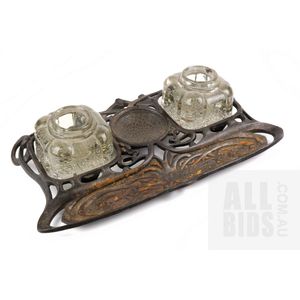Art Nouveau Cast Iron Standish (1905)
Art Nouveau cast iron standish with rd no 437759, circa 1905
You must be a subscriber, and be logged in to view price and dealer details.
Subscribe Now to view actual auction price for this item
When you subscribe, you have the option of setting the currency in which to display prices to $Au, $US, $NZ or Stg.
This item has been sold, and the description, image and price are for reference purposes only.
- Registered Numbers - Between 1842 and 1883, a diamond- shaped mark was used to identify items as British-made, which classified the item according to the material from which it was manufactured, as well as the date of registration. This system was discontinued in 1884 when a numbering system was introduced.
Design registration is for "what and item looks like", and is not a patent ("how something works") or trade mark ("what it is called").
The registered number is usually on an under-surface of an object (on the base of ceramics) and oftern shown as "Rd. No. 99999", sometimes surrounded by a rectangular box.
The table below lists the year, and the first registered number for that year:
1884 1
1885 18,993
1886 39,547
1887 61,207
1888 87,266
1889 111,664
1890 140,481
1891 160,613
1892 183,259
1893 203,348
1894 223,861
1895 244,726
1896 266,237
1897 288,848
1898 309,956
1899 328,527
1900 349,120
1901 367,628
1902 380,979
1903 401,944
1904 422,489
1905 428,004
1906 469,160
1907 486,464
1908 516,375
1909 533,561
1910 546,084
1911 561,570
1912 585,707
1913 608,541
1914 627,887
1915 642,613
1916 651,079
1917 655,001
1918 662,576
1919 665,728
1920 664,869
1921 676,491
1922 685,412
1923 691,571
1924 695,944
1925 705,943
1926 716,386
1927 723,430
1928 725,899
1929 740,459
1930 741,336
1931 757,945
1932 767,110 - Standish - Although the word is little used nowadays, a standish is an inkstand on feet and usually in silver or silver plate, containing some of the following: inkwells, a pounce pot, a sealing wax container and a pen rest. Standishes are also found in less common materials including boulle, marble, brass and wood.
- Circa - A Latin term meaning 'about', often used in the antique trade to give an approximate date for the piece, usually considered to be five years on either side of the circa year. Thus, circa 1900 means the piece was made about 1900, probably between 1895 and 1905. The expression is sometimes abbreviated to c.1900.
- Art Nouveau Period - The Art Nouveau period was a cultural movement that emerged in the late 19th century, and was characterized by its emphasis on natural forms, flowing lines, and a decorative, ornamental style. Art Nouveau was a reaction against the ornate and heavily stylized designs of the previous era, and sought to create a new, more organic aesthetic.
Art Nouveau was characterized by its use of sinuous, curving lines, as well as a focus on natural elements such as flowers, vines, and other organic shapes. Art Nouveau designers sought to create a total work of art, in which every element of a building or object was designed to be harmonious with the overall design.
Some of the most iconic examples of Art Nouveau design include the Paris Metro entrances designed by Hector Guimard, the works of the artist Alphonse Mucha, and the architecture of Victor Horta in Brussels.
The Art Nouveau period was at its peak between 1890 and 1910, but began to decline in popularity by the start of World War I. However, Art Nouveau remains an important influence on design and art to this day, and continues to be celebrated for its emphasis on natural forms and decorative style.
This item has been included into following indexes:
